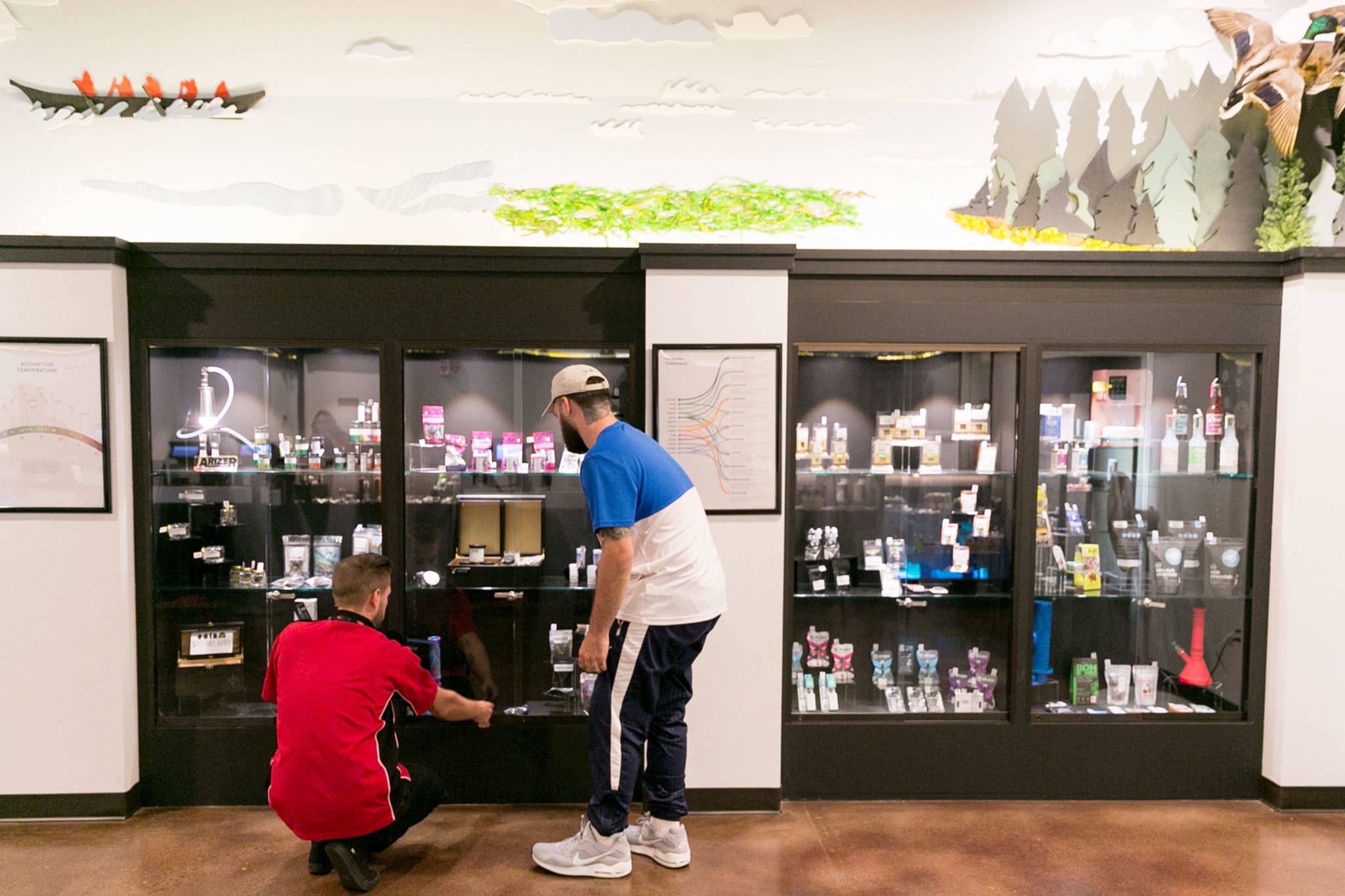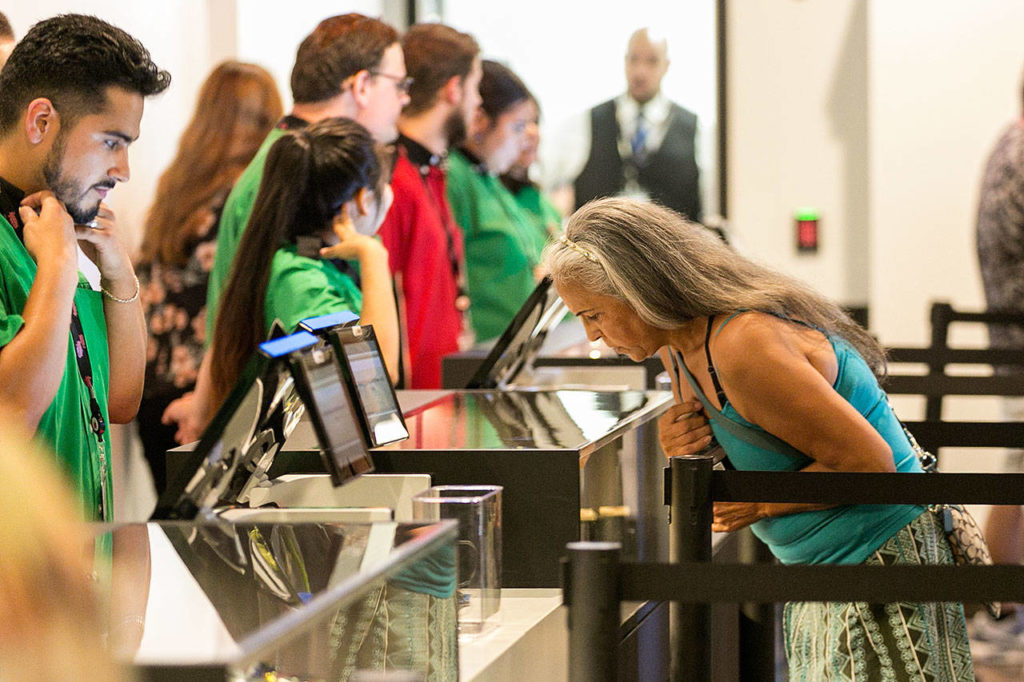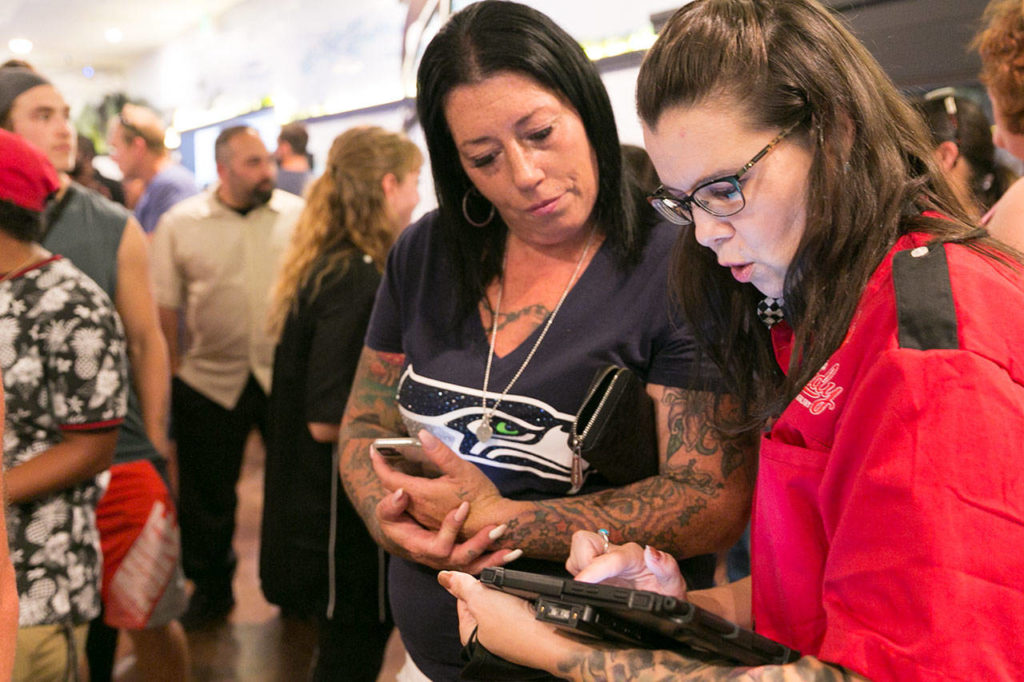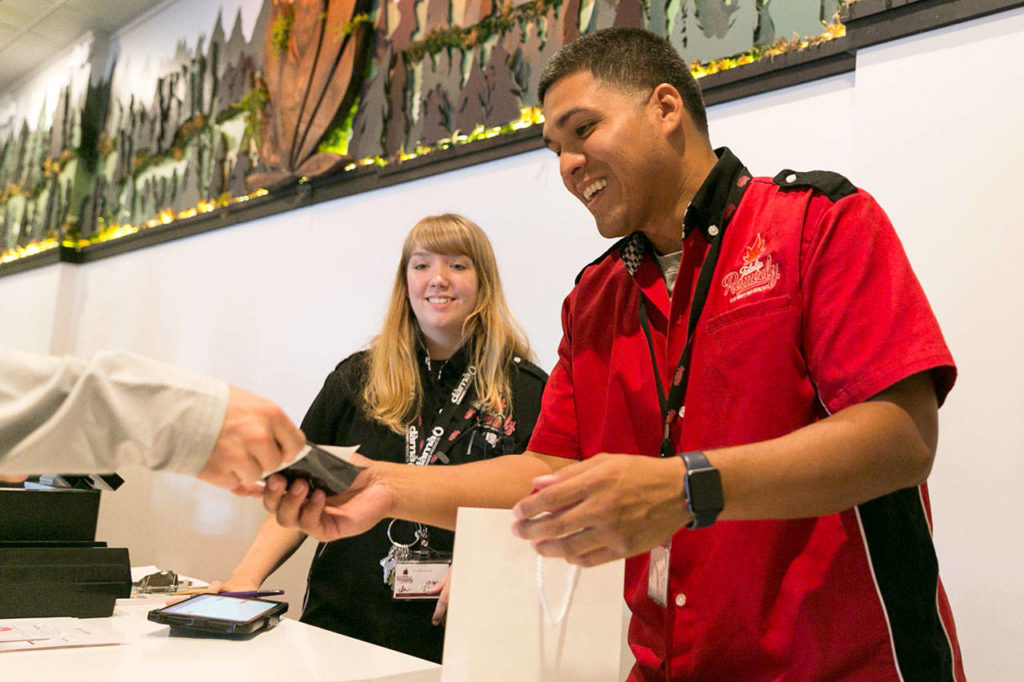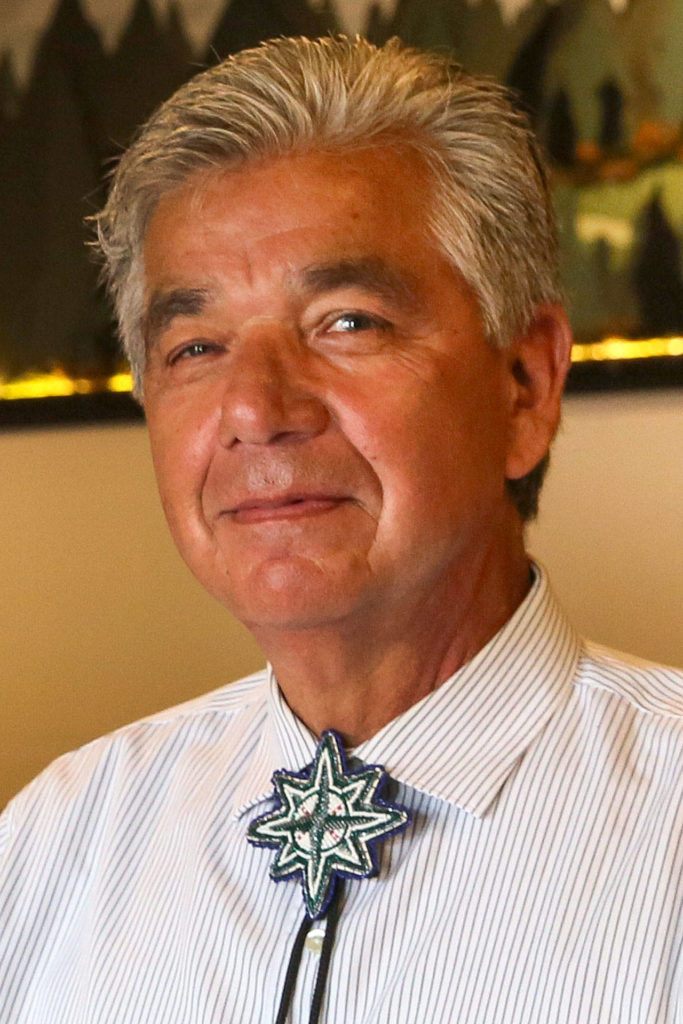TULALIP — The pointy leaf on the sign is red, not green.
Workers greet customers at the door with computer tablets to assist and take orders.
Three front-row parking spots are designated for “Elders only.”
Tulalip Remedy is not a typical pot shop.
The flagship store is owned by the Tulalip Tribes, a sovereign nation with its own governing body and laws. Out of 497 licensed cannabis stores in the state, this is only the sixth to open on tribal land.
The emporium is an oasis in the parking lot at Quil Ceda Village in the former KeyBank building. Sleek and modern, it boasts glass display cases like a jewelry store. An artsy Pacific Northwest mural encircles the room.
“Oh, man. It’s impressive,” said Randy Ervin, a Tulalip resident who came for sativa concentrate at the opening Aug. 9. At his feet was his little service dog, Jaxx, who stayed mellow among the noisy crush of shoppers.
The Tulalip Tribes waited four years after recreational weed stores opened in Washington to partake in the retail action. The tribes and the state have a compact, a negotiated agreement that spells out the mutual guidelines for dispensing the drug.
The tribes also are funding research at a Stanford University lab in California to study the medicinal attributes of marijuana.
There are 51 cannabis retailers in Snohomish County. Before, Tulalip members had to leave the reservation to get a remedy to toke or vape to heighten their wellness or soothe their ailments. That meant traveling to Everett, Arlington or Lake Stevens. Marysville banned sales within city limits.
This is no mom-and-pop head shop with bars on the windows.
It’s a high-tech fortress. The tribes invested in the latest technology for merchandising. There are 62 cameras, with plans to add more. The windows are stylishly boarded with polished wood as a design accent.
Inside is a weed wonderland. The store sells tinctures, rubs and edibles. Indica, sativa and hybrid strains of flower. Pipes, bongs and vaporizers. Budtenders explain the ABCs of THC and CBD with user-friendly graphics and charts.
The expansive Quil Ceda Village is popular grounds for locals to shop and maybe shoot craps. There’s a Walmart, Cabela’s, The Home Depot, Seattle Premium Outlets and the Tulalip Resort Casino.
It’s a gambling-dining-shopping destination.
More than half of the hundreds of thousands of tourists are Canadian, said Les Parks, an elected member of the Tulalip Tribes Board of Directors.
Which brings up the red leaf, which was designed to represent gathering around a fire, not be a beacon for the northern neighbors.
“When they see that, they are thinking maple leaf. ‘Here’s a Canadian restaurant. Let’s get something to eat,’” Parks said.
“They come in and find out what it is and they walk out the door giggling.”
No wacky tabacky needed.
1-2-3 … Grow
Cannabis on the reservation was once a pipe dream for Parks, a longtime tribal leader.
He was the driving force for the tribes to get into the market.
Not all members were in favor.
“They said this tribe will never get into the marijuana business,” Parks said. “It has been a four-year journey.”
Washington has 29 tribes who are not bound by state restrictions, and in 2015 the first tribal pot compact was signed by the Suquamish. The Puyallup Tribe has both a pot testing lab and a store. In July, the Muckelshoots opened Joint Rivers in Auburn with the first drive-thru window at a cannabis shop in the state.
Remedy plans to add window service. The former bank building has the bones for it.
You won’t find those on Highway 99.
“State licensees cannot have drive-up windows. They are not allowed under law,” said Mikhail Carpenter, Washington State Liquor and Cannabis Board spokesman. “But they are not expressly prohibited under compacts.”
Revenues have blossomed since recreational cannabis shops opened in 2014 in Washington, two years after voters passed Initiative 502, which legalized the sale, consumption and taxation of recreational marijuana products.
The drug is illegal under federal law, but tribes in Washington haven’t had any issues despite the Trump administration’s rescinding Obama-era guidance that had recognized tribal sovereignty over pot.
“In the first full year of legalization it generated $64 million in excise tax,” Carpenter said. “In the last fiscal year completed it was $357 million.”
A 37 percent excise tax is levied on the sale from retailer to consumer — in addition to sales tax.
Tribal stores are required to tax the same percentage as what others stores pay to the state. That amount is retained by the tribes instead of going to city and state coffers.
The Tulalips have earmarked its use.
“A percentage of the profits is going to addiction and problems on the reservation,” such as homelessness and mental health, Parks said.
There are nearly 5,000 members of the tribes, of which about half live on the 22,000-acre reservation north of Everett and west of Marysville.
Customer service
Nick Roman came from Lake Stevens for “some flower.”
He’s already a repeat customer and Remedy rewards member.
“It’s good product. Good service, too,” he said. “It’s more of a Starbucks setup. Order. Get it. Leave.”
Cynthia Leon-Ortiz popped in for oil-based cannabis potions.
“It helps me sleep,” she said. “If I have daily activities that are strenuous it helps me with my body aches. It gets me through the day. When I take pills it is more harsh on my body.”
It was her third time at Tulalip Remedy.
“This place doesn’t judge you,” the Tulalip resident said. “This is my new go-to.”
Business has been steady at Tulalip Remedy, but not yet the green rush the tribes anticipates to come. On a recent weekday mid-afternoon, employees far outnumbered shoppers.
Many of Tulalip Remedy’s 62 employees are tribal members. All underwent extensive training. Service is personal and concierge style, using the Apple store model of sorts.
“We’ve taken the traditional budtender away from the counter and put them out on the retail floor. We’ve given them hand-held units so they have an opportunity to walk up to each person and engage them where they are in their cannabis journey,” said Jonathan Teeters, assistant manager. “Whether you’re a first-time customer or never used cannabis or you’re a pro.”
Workers wear uniform shirts color-coded to denote their positions, like the “Star Trek” crew. Budtenders wear red and carry tablets that explain the menu of products. Behind the counter, cashiers in green ring up orders. Managers don black shirts.
After paying with cash, customers get a ticket number for orders, which are quickly filled in the back, then placed in a small, protected window behind the counter. Shoppers can also order ahead online and their order will be ready when they arrive.
There’s a Remedy rewards program for specials and discounts. Sign up and get a text for 10 percent off.
Radio-frequency identification tags, known as RFID, are put on every item to track sales. Unlike a barcode, which is also used, the postage stamp-sized tag doesn’t have to be within sight of the reader. Macy’s also uses RFID.
“It allows the tribes to be assured that we have 100 percent control of our inventory at all times,” said Doug Boon, store manager. “It gives us more consumer intelligence for patrons who come here and allows us to build better points of sale for them.”
In another move, the Tulalips Tribes established its own regulatory body, the Tribal Cannabis Agency, to monitor itself.
“No other tribe has that,” Carpenter said. “They are the first ones.”
The cure
Parks dispels the old stereotypes of reefer madness.
“Our customers are not ‘Cheech and Chong,’” he said. “The old theory that cannabis is the gateway to addiction is outdated. That’s Nixon theory.”
Marijuana was placed as a Schedule I, the most dangerous group of controlled substances, under Richard Nixon’s watch.
The majority of people who use marijuana do not go on to use “harder” substances, according to the National Institute of Drug Abuse.
Instead, it could possibly offer the cure for more serious addictions, such as opioids.
The tribes are sponsoring research at the Barron Lab by Stanford bioengineering professor Annelise Barron, director of the California campus site.
“This is exciting because it is still difficult to obtain federal funding to study for the benefits of cannabis,” said Barron, who got her undergraduate degree in 1990 at the University of Washington and also earned post-doctoral degrees elsewhere. “Specifically, we’re doing a rat study to determine the efficacy of cannabinoids to treat opioid addictions.”
Another research project is its use for Alzheimer’s disease.
Already, CBD, a non-psychoactive cannabinoid isolated from the cannabis plant, is in products targeted for issues such as pain and insomnia. CBDs don’t contain the THC that gets users high.
But that euphoria is why many shop here.
Parks expects Tulalip Remedy to reap a bundle.
“Twenty million a year in sales is not out of the question,” he said. “If you’re earning $20 million in revenues, that’s $10 million in profit.”
Still, pot has nothing on gaming.
“By gaming standards it’s not a big revenue-producing impact to tribes, but it is an impact. And every little impact is a positive to each tribe’s membership,” Parks said.
Tulalip Remedy is managed and overseen by the Tulalip Economic Development Corporation. The store is just the start for the new tribal organization geared toward business.
Vertical integration is the buzzword here.
In Washington, there are three separate license tiers: producer, processor and retailer. State law prohibits people from doing all three.
But state law does not govern sovereign nations like the Tulalip Tribes.
“We can do all three. Our compact allows it,” Parks said.
He envisions a grow operation, a testing lab and a processing facility to supply this store and possibly more to come.
“We are going to get there. It’s not a question of if, it’s when.”
Andrea Brown: abrown@heraldnet.com; 425-339-3443. Twitter @reporterbrown.
Talk to us
> Give us your news tips.
> Send us a letter to the editor.
> More Herald contact information.
